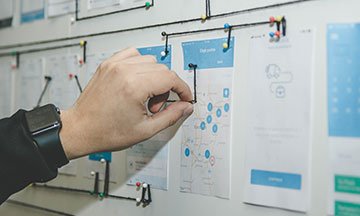Risk Based Maintenance (RBM) Techniques, Strategy, and Applications
| Date | Venue | Duration | Fees | |
|---|---|---|---|---|
| 06 May - 17 May, 2024 | Dubai | 10 Days | $8775 | Register |
| 03 Jun - 07 Jun, 2024 | Dubai | 5 Days | $4750 | Register |
| 08 Jul - 12 Jul, 2024 | Dubai | 5 Days | $4750 | Register |
| 14 Jul - 25 Jul, 2024 | Riyadh | 10 Days | $9150 | Register |
| 12 Aug - 23 Aug, 2024 | Singapore | 10 Days | $9850 | Register |
| 12 Aug - 16 Aug, 2024 | Dubai | 5 Days | $4750 | Register |
| 23 Sep - 27 Sep, 2024 | Dubai | 5 Days | $4750 | Register |
| 07 Oct - 11 Oct, 2024 | Singapore | 5 Days | $5695 | Register |
| 14 Oct - 18 Oct, 2024 | Dubai | 5 Days | $4750 | Register |
| 04 Nov - 08 Nov, 2024 | Dubai | 5 Days | $4750 | Register |
| 16 Dec - 20 Dec, 2024 | Dubai | 5 Days | $4750 | Register |
Course Overview
What is risk assessment in maintenance?
The integrity of any plant and its assets depends on good maintenance. For better maintenance, risks should be measured, and proper strategies and techniques should be applied to avoid failures of the assets. Diverse techniques and strategies are available that sufficiently improve the performance of the plant and ensure that no single asset fails.
Moreover, the profit gained from the plant is usually because of the cost-effective plans and procedures in place. That is why it is important that all the risks are properly identified and measured, and risk criteria are considered. Additionally, significant tasks also include the knowledge and application of the Risk-Based Maintenance (RBM) techniques and strategies. As a result, the life of the assets will be improved, and the profitability of the organization will be increased.
What is RBM in Maintenance?
Zoe is aware that properly applied maintenance techniques, plans, strategies, and procedures can save organizations from wasting poles of money. The expert instructors have hands-on experience with RBM (Risk-Based Maintenance). They are indulged in developing and delivering to the point effective content that will ultimately help the trainees in their careers. The trainees will be able to excel in their careers in the organization of their choice as the content is developed considering the ongoing market trends and technologies.
Course Objectives
RBM techniques, strategies, and application course will assist the trainees in accomplishing the following objectives:
- Comprehension of the RBM, its methodology, and application of the RBM program
- Development of effective strategies as per the unique environment
- Understand the participation of the RBM in maintenance and effective performance
- Apprehension of the risk and its role in developing plans
- Understanding the failure, its probability, system behaviour during failure, and effects of failure on the risks
- Selection of the correct technology as per the unique situation
- Proper and effective integration of RBM with other techniques such as RBI and PFA
- Usage of Key Performance Indicators in order to perform
- Tips and tricks for the best application of the RBM
- Developing an action plan using RBM and ensuring that RBM is best utilized for the sake of management of assets
Training Methodology
Zoe understands the importance of each course; hence expert instructors ensure that each topic will be aligned with the market’s requirements. The professional instructors have real market experience, and they pass on this experience to the trainees and increase their abilities to work in the real market. All courses of the Zoe are meant to produce individuals who are able to work as experts in the market from the very first day after the completion of their respective courses. For this reason, the content of all of the courses is thoroughly reviewed to ensure that these topics are aligned with the current market requirements. Moreover, a Do-Review-Learn-Apply model is developed and used by Zoe to maximize the participation of the trainees by using techniques like group activities, projects, role plays, and so on.
Organisational Benefits
The RBM Techniques, Strategy, and Applications course has the following organizational benefits:
- Improved ability of the staff to decrease the risks related to assets
- Increased profitability of the organization due to effective plans and procedures
- Development and application of RBM plans and procedures according to the unique situation
- Reduced cost on the assets because of the predictive maintenance
- Understanding Key Performance Indicators (KPI) and utilizing KPI to better performance
Personal Benefits
The RBM Techniques, Strategy, and Applications course has many benefits for the trainees, which are written below:
- Understating the importance of the risks
- Improved ability to understand the risks and develop thinking related to risks for improvement of the plant in terms of cost
- Determining the techniques and strategies unique to situations
- Increased confidence in the individual while developing plans and procedures
- Better ability to detect the fault and decision-making
Who Should Attend?
- Quality Engineer Maintenance Manager
- Reliability Engineer
- Corrosion Engineer
- Asset Integrity Manager
- Compliance Officer
- Facilities Planning Analyst
- Maintenance Engineer
- Engineering Professionals
- Production Heads
- Facility Managers
- Asset Supervisor
- Asset Coordinators
- Quality Control Analyst
- Mechanical Engineer
- Any Individual who has an interest in RBM and aims to excel in this field
Course Outline
All of the crucial topics that are required to excel in this field are given below:
Module 1: Introduction to RBM
- Define RBM.
- Importance of RBM
- Benefits of the RBM
- Background of RBM
- RBM in old times and advancements in the present era
Module 2: The Depth of Risk in Maintenance
- Define risk
- How is it helpful in maintenance?
- Different types of risks
- Identification of the risk
- Risk analysis in terms of maintenance
- In-depth understating of the risk
Module 3: Maintenance and Reliability
- Effects of maintenance on the business
- Reference plan of maintenance
- Depreciation of assets
- Reasons of failure
- Basic types of failures
- How to improve asset-life?
- Management of the assets to realize assets value
Module 4: Some Common Engineering Tools
- The RAMS
- Cost and benefits decision (the threshold for maintenance)
- The risk matrix
Module 5: Strategies
- HI-HP
- LI-HP
- HI-LP
- LI-LP
- Monitor
- Run to Failure
Module 6: RBM Attributes
- Learning curve
- Risk Assessment
- Balance creation of the Consequence of Failure (CoF) and Probability of Failure (PoF)
Module 7: Techniques
- Criticality (Risk) Analysis
- FMEA
- FCA
- Event Tree Analysis
- Fault Tree Analysis
- Important concepts to understand for techniques
- Asset Utilization Index
- Asset Strategic Importance
- Criticality Matrix
Module 8: Implementation
- Seven steps of RBM while integrating with FMECA
- Patterns of failures
- Identification of maintenance tasks and frequencies
- Weibull distribution
Module 9: Other Important Implementations
- Use of decision support tools for optimization of maintenance tasks and frequencies
- Some equipment-oriented tasks:
- Monitoring of the condition
- Testing and inspection
- Predictive maintenance technologies
Module 10: Integration with Other Technologies
- Integration of the spare parts, facilities, and tools
- Interaction with maintenance workflow
- Integration with Risk-Based Inspection (API 580)
- Interaction of RBM with Potential Failure Analysis (PFA)
Module 11: Plan and Procedures
- Optimizing maintenance tasks
- Developing an action plan unique to different situations
- Improvement of the plans through continuous data monitoring
Module 12: Key Performance Indicators (KPI)
- What are the KPIs?
- Why the KPIs are important?
- What are the benefits of KPIs?
Module 13: Review and Implementations
- A brief review of the crucial topics
- Implementing important training topics











